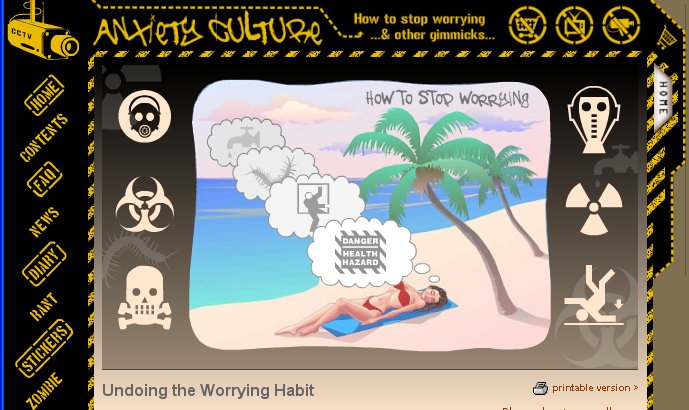 I found a great site today that I think you might want to check out. It’s called Anxiety Culture www.AnxityCulture.com in particular there was a great article on “How To Stop Worrying” that offers some very helpful techniques along with quite a bit of welcome humor.
I found a great site today that I think you might want to check out. It’s called Anxiety Culture www.AnxityCulture.com in particular there was a great article on “How To Stop Worrying” that offers some very helpful techniques along with quite a bit of welcome humor.
Because I know you have so much to worry about right now and probably won’t click through to read the article I’ll do my best to summarize it for you.
According to the author, there are 2 obstacles to getting over worry.
- Happiness has to be earned and therefore we don’t “deserve” to be happy:
“Centuries-old cultural conditioning has given us a nasty neurosis: the belief that happiness must be “earned”. It can be “earned” only by enduring unpleasantness (eg work, pain, misery). But how do you know if you’ve endured enough unpleasantness to deserve happiness? Another unspoken game rule: “responsible adults” can never endure enough unpleasantness to truly deserve happiness.” - The idea that worrying serves a purpose.
“You won’t stop worrying if you think it serves you. So it’s a good idea to distinguish the fight-or-flight response (a healthy bodily reaction to immediate danger) from worry (a psychological problem). By making this distinction, you’re less likely to overrate the value of worrying.”
In my own experience with anxiety (really just a more intense form of worry) as well as working with hundreds of anxiety sufferers over the years is that one of the key beliefs is that “if you care about someone then you will worry about them.” This is particularly true of parents and their children. Nobody wants to be thought of as “uncaring”. My mom used to tell me she would lie awake worrying about me imagining me lying in a pool of blood…Essentially that kind of worrying is like a “negative prayer.” So letting go of some of these old beliefs and cultural “programs” is essential in worry and anxiety relief.
The author of the article then goes on to give two techniques to reduce worry.
The first one is:
“The trick is that whenever you feel plagued by a worrying thought, note it down on a “worry sheet” (a piece of paper set aside for the purpose) – you can then forget about it, knowing that you plan to worry later.”
I have not personally tried this technique but I’d love to hear from any of you out there in cyber space you might want to give this a try.
The second one is based on the understanding that your mind can’t process a negative (something I’ve said about a gazillion times before). Even though you consciously don’t think you want it, telling yourself to not thinking about crashing the car causes your unconscious mind to think about crashing the car. So the Anxiety Culture author uses the analogy of drinvg a car with one foot on the brake and one foot on the accelerator…and your feet are tied together. So in order to stop one you have to stop both but your mind refuses…so the author suggests the solution is
“You somehow have to persuade (or con) your brain into thinking it’s safe to lift both feet from the worry pedals.”
No solution is given on how to do that…which is fine because that’s where I come in. In my r experience, the way to persuade your mind to lift both feet off the pedals is available through the combined modern jedi mind mastery tools of NLP, Time Line, EFT and Hypnosis.
Of course if you’re like most anxiety sufferers you worry that NLP, Time Line Therapy, EFT and Hypnosis are effective for other people, you worry that you won’t be able to afford it...or you’ll worry that you’ll pay a lot of money but not get the relief promised...do you see how worrying just messes with your mind?
If you sincerely can’t stand being controlled by the worry, anxiety, panic monkey on your back any longer and are willing to let go of some of the old notions that “worry” is noble or good or whatever. Then drop me an e-mail at mark [at] MarkShepard.com or call my office at 203-495-8808 (9-5 Eastern US Time)
In the meantime if you’re curious how the media feeds your worry every day check out www.AnxityCulture.com
or Read the full article “How To Stop Worrying”
As always, please leave a comment below and share this post with “Stumbleupon”, “Digg”, Facebook etc.
Yours truly,
Mark Shepard, NLPT